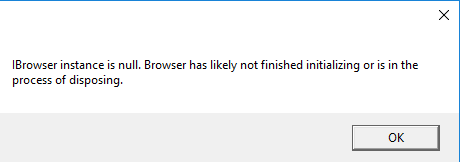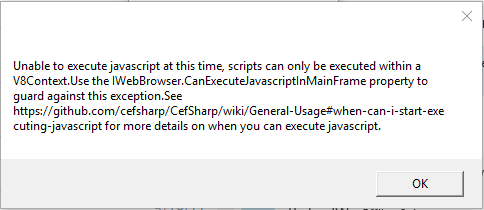Whenever I try to execute JavaScript through C# using CefSharp (Stable 57.0), I get an error. I am simply trying to execute the alert function, so I can make sure that works and later test it out with my own function. However, I seem to be getting errors trying to do so.
public partial class WebBrowserWindow : Window
{
public WebBrowserWindow()
{
InitializeComponent();
webBrowser.MenuHandler = new ContextMenuHandler();
webBrowser.RequestHandler = new RequestHandler();
}
//Trying to execute this with either method gives me an error.
public void ExecuteJavaScript()
{
//webBrowser.GetMainFrame().ExecuteJavaScriptAsync("alert('test')");
//webBrowser.ExecuteScriptAsync("alert('test');");
}
}
I have tried both ways of executing the script.
The first one:
webBrowser.GetMainFrame().ExecuteJavaScriptAsync("alert('test')");
Gives me this error:
The second:
webBrowser.ExecuteScriptAsync("alert('test');");
Gives me this error:
My objective is to create a C# function that can execute a JavaScript function in my CefSharp Browser.
I tried many links/references and there weren't that many on stack overflow. I also read The FAQ for CefSharp and couldn't find any simple examples that allow me to execute JavaScript at will through C#.
In addition, I've verified the events where the Frame is loaded (it finishes loading), and unloaded (it does not unload), and if the webbrowser is null (which it's not), and the message from the:
webBrowser.GetMainFrame().ExecuteJavaScriptAsync("alert('test')");
still causes the first error to occur.
I tested for GetMainFrame(). It always returns null. ALWAYS. Doesn't matter how long I wait, or what conditions I check for.
IMPORTANT
I forgot to add one crucial piece of information, I have 2 assemblies in my project. Both of them compile into separate executables:
Helper.exe Main.exe
main.exe has a window "CallUI" that, when a button gets clicked, it executes the method I created "ExecuteJavaScript()", which is inside of my window "BrowserWindow". The CallUI window is declared and initialized in Helper.exe.
So basically I am trying to use a separate program to open a window, click a button that calls the method and execute javascript. So I think because they are different processes, it tells me the browser is null. However, when I do it all in Main.exe it works fine. Is there a workaround that allows me to use the separate process to create the window from Helper.exe and execute the Javascript from Main.exe?


